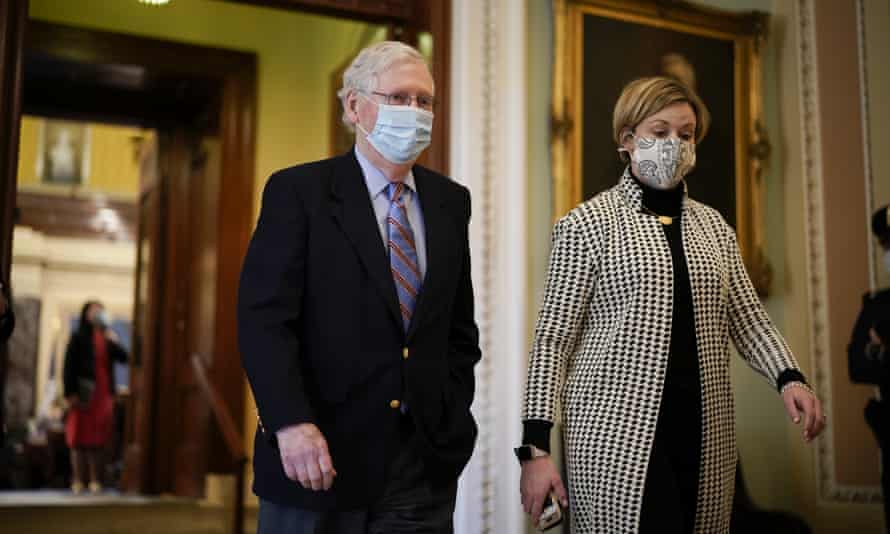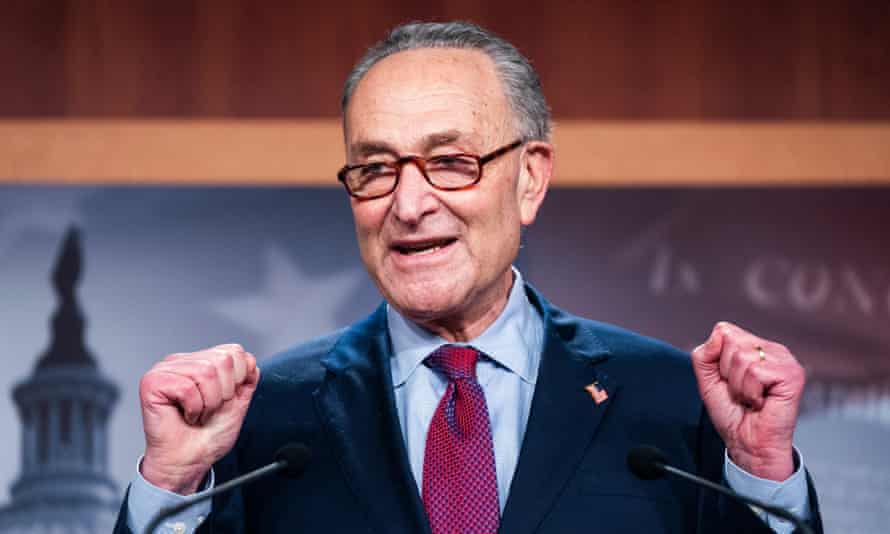Joe Biden hailed “one more giant step forward on delivering on that promise that help is on the way”, after Democrats took a critical step towards a first major legislative victory since assuming control of Congress and the White House, with a party-line vote in the Senate to approve a $1.9tn coronavirus relief bill.
After a marathon voting session through the night on Friday and into Saturday afternoon, Democrats overcame unified Republican opposition to approve the sweeping stimulus package. The final tally was 50-49, with one Republican absent.
One of the largest emergency aid packages in US history now returns to the House for final approval before being signed into law by Biden. Nancy Pelosi, the House speaker, has said she expects to approve the measure before 14 March, when tens of millions of Americans risk losing unemployment benefits if no action is taken.
In a statement, the House majority leader, Steny Hoyer, said the Senate version of the American Rescue Plan would be considered “on Tuesday … so that we can send this bill to President Biden for his signature early next week”.
Biden and Democrats will look to move on to other priorities, including voting rights reform and an ambitious infrastructure package.
The bill aimed at combating the Covid-19 pandemic and reviving the struggling US economy will provide direct payments of up to $1,400 to most Americans; extend federal unemployment benefits; rush money to state, local and tribal governments; and allot significant funding to vaccine distribution and testing.
Republicans attacked the bill as a “liberal wishlist” mismatched with an improving economic and public health outlook as more Americans are vaccinated and infections plateau.
“Our country is already set for a roaring recovery,” said Mitch McConnell, the Senate minority leader, on Friday, citing a jobs report that showed 379,000 jobs added in February. “Democrats inherited a tide that was already turning.”

But Democrats and the White House were quick to push back, pointing to more than 9 million Americans out of work and millions more struggling to pay for rent and food.
On Saturday, with Vice-President Kamala Harris looking on, Biden spoke to reporters at the White House.
“I want to thank all of the senators who worked so hard to reach a compromise,” he said, “to do the right thing for the American people during this crisis and voting to pass the American rescue plan. It obviously wasn’t easy, wasn’t always pretty, but it was so desperately needed. Urgently needed.”
Biden has been criticised for not holding a press conference since taking office. On Saturday he attempted to leave without taking questions. Answering shouted questions, he avoided direct criticism of Senator Joe Manchin of West Virginia or Republicans who were against his bill.
The marathon “vote-a-rama” session that preceded the final Senate vote featured the longest recorded vote in Senate history, just shy of 12 hours, on Friday, as Democrats scrambled to strike a deal with Manchin, a moderate who mounted a last-minute push to scale back unemployment benefits.
Bowing to Manchin, the resulting compromise will keep benefits at $300 a week instead of $400, as proposed by Biden and approved by the House. However, the benefits will be extended until October rather than August, and Democrats added a provision to provide up to $10,200 in tax relief for unemployed Americans.
Speaking to reporters, the Senate majority leader, Chuck Schumer, repeatedly hailed his caucus and deflected invitations to criticise Manchin.
“People have new differences all the time,” he said, when asked why Manchin had not levelled his demand earlier, adding: “Unity, unity, unity. That’s how we got this done.”
Schumer was also asked if he thought another bill might yet be needed.
“It’s a very strong bill,” he said, “part of it will depend on Covid. How long will it last, will there be a new strain.”
Experts have warned of a potential fourth surge as variants emerge and predominantly Republican states reopen their economies and abandon basic public health measures such as mask mandates.
“Part of it will depend on the economy,” said Schumer. “It has some underlying weaknesses that need bolstering. How deep and weak are those. Our No 1 lodestar is going to be helping the American people and if they need more help, we’ll do another bill. If this bill is sufficient, and I think it’s going to help in a big way, then we won’t.”
At the White House, Biden praised Schumer: “When the country needed you most you lead, Chuck, and you delivered.”
Despite deep political polarization and staunch Republican opposition, the legislation has broad public appeal. A poll by Monmouth University found that 62% of Americans approve of the stimulus package, including more than three in 10 Republicans.
Yet the endeavor tested the fragile alliance between progressives and moderates as Democrats attempt to wield their power with only the barest control of Congress.

Early on Friday, the Senate rejected a proposal by the Vermont senator Bernie Sanders to include a $15-an-hour minimum wage increase, a top liberal priority and a key plank of Biden’s economic agenda. The Senate parliamentarian had deemed the provision inadmissible under the rules of a special budget process Democrats are using to bypass Republican opposition.
Despite widespread public support for raising the federal minimum wage, Democrats remain divided over the measure. On Friday, eight joined all Republicans in blocking the amendment, which would have required 60 votes to pass.
“Let me be very clear: we are not giving up on this,” Sanders said. “We are going to come back with vote after vote. And one way or the other we are going to pass a $15 minimum wage. That is what the American people want and that is what the American people need.”
The approval of the bill in the Senate came after hours upon hours of voting on a torrent of amendments, most of which were offered by Republicans with the goal of forcing Democrats to take a position on measures designed to be politically troublesome.
Proceedings had already been much delayed on Thursday, when the Republican senator Ron Johnson of Wisconsin forced Senate clerks to read the 628-page bill in its entirety – a task that took nearly 11 hours.
At the White House, Biden quoted Sanders as he hailed the bill as “progressive” and delivered a familiar appeal for national – and party – unity, if with a shot at his predecessor, Donald Trump.
“When I was elected,” Biden said, “I said we’re going to get the government out of the business of battling on Twitter and back in the business of delivering for the American people, of making a difference in their lives, giving everyone a fighting chance, of showing the American people that their government can work for them, and passing the American Rescue Plan, we’ll do that.
“You know it may sound strange but … I really want to thank the American people … quite frankly, without the overwhelming bipartisan support of the American people this would not have happened.
“… Every public opinion poll shows that people want this, they believe it is needed. And they believe it’s urgent.”
This content first appear on the guardian
